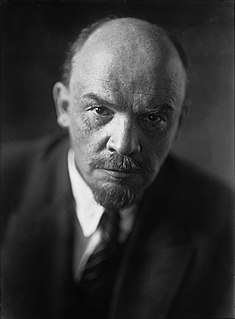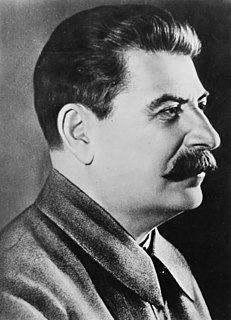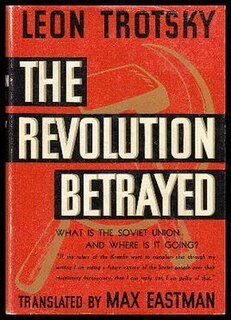
Lev Davidovich Bronstein, better known as Leon Trotsky, was a Russian Marxist revolutionary, political theorist and politician. Ideologically a Marxist, his developments to the ideology are called Trotskyism.

Leninism is a political ideology developed by Russian Marxist revolutionary Vladimir Lenin that proposes the establishment of the dictatorship of the proletariat led by a revolutionary vanguard party as the political prelude to the establishment of communism. The function of the Leninist vanguard party is to provide the working classes with the political consciousness and revolutionary leadership necessary to depose capitalism in the Russian Empire (1721–1917). Leninist revolutionary leadership is based upon The Communist Manifesto (1848), identifying the communist party as "the most advanced and resolute section of the working class parties of every country; that section which pushes forward all others." As the vanguard party, the Bolsheviks viewed history through the theoretical framework of dialectical materialism, which sanctioned political commitment to the successful overthrow of capitalism, and then to instituting socialism; and, as the revolutionary national government, to realise the socio-economic transition by all means.

The Russian Revolution was a period of political and social revolution that took place in the former Russian Empire which began during the First World War. This period saw Russia abolish its monarchy and adopt a socialist form of government following two successive revolutions and a bloody civil war. The Russian Revolution can also be seen as the precursor for the other European revolutions that occurred during or in the aftermath of WWI, such as the German Revolution of 1918.

Stalinism is the means of governing and Marxist-Leninist policies implemented in the Soviet Union from 1927 to 1953 by Joseph Stalin. It included the creation of a one-party totalitarian police state, rapid industrialization, the theory of socialism in one country, collectivization of agriculture, intensification of class conflict, a cult of personality, and subordination of the interests of foreign communist parties to those of the Communist Party of the Soviet Union, deemed by Stalinism to be the leading vanguard party of communist revolution at the time. After Stalin's death and the Khrushchev thaw, de-Stalinization began in the 1950s and 1960s, which caused the influence of Stalin’s ideology begin to wane in the USSR. The second wave of de-Stalinization started during Mikhail Gorbachev’s Soviet Glasnost.

Trotskyism is the political ideology and branch of Marxism developed by Ukrainian-Russian revolutionary Leon Trotsky and some other members of the Left Opposition and Fourth International. Trotsky self-identified as an orthodox Marxist, a revolutionary Marxist, and Bolshevik–Leninist, a follower of Marx, Engels, and 3L: Vladimir Lenin, Karl Liebknecht, and Rosa Luxemburg. He supported founding a vanguard party of the proletariat, proletarian internationalism, and a dictatorship of the proletariat based on working-class self-emancipation and mass democracy. Trotskyists are critical of Stalinism as they oppose Joseph Stalin's theory of socialism in one country in favour of Trotsky's theory of permanent revolution. Trotskyists criticize the bureaucracy and anti-democratic current developed in the Soviet Union under Stalin.
The ten years 1917–1927 saw a radical transformation of the Russian Empire into a socialist state, the Soviet Union. Soviet Russia covers 1917–1922 and Soviet Union covers the years 1922 to 1991. After the Russian Civil War (1917–1923), the Bolsheviks took control. They were dedicated to a version of Marxism developed by Vladimir Lenin. It promised the workers would rise, destroy capitalism, and create a socialist society under the leadership of the Communist Party of the Soviet Union. The awkward problem was the small proletariat, in an overwhelmingly peasant society with limited industry and a very small middle class. Following the February Revolution in 1917 that deposed Nicholas II of Russia, a short-lived provisional government gave way to Bolsheviks in the October Revolution. The Bolshevik Party was renamed the Russian Communist Party (RCP).

Lenin's Testament is a document dictated by Vladimir Lenin in late 1922 and early 1923. In the testament, Lenin proposed changes to the structure of the Soviet governing bodies. Sensing his impending death, he also gave criticism of Bolshevik leaders Zinoviev, Kamenev, Trotsky, Bukharin, Pyatakov and Stalin. He warned of the possibility of a split developing in the party leadership between Trotsky and Stalin if proper measures were not taken to prevent it. In a post-script he also suggested Joseph Stalin be removed from his position as General Secretary of the Russian Communist Party's Central Committee.
The United Opposition was a group formed in the All-Union Communist Party (Bolsheviks) in early 1926, when the Left Opposition led by Leon Trotsky, merged with the New Opposition led by Grigory Zinoviev and his close ally Lev Kamenev, in order to strengthen opposition against the Joseph Stalin led Centre. The United Opposition demanded, among other things, greater freedom of expression within the Communist Party, the dismantling of the New Economic Policy (NEP), more development of heavy industry, and less bureaucracy. The group was effectively destroyed by Stalin’s majority by the end of 1927, having had only limited success.
Joseph Stalin was the General Secretary of the Communist Party of the Soviet Union's Central Committee from 1922 until his death in 1953. In the years following Lenin's death in 1924, he rose to become the leader of the Soviet Union.

Joseph Stalin started his career as a student radical, becoming an influential member and eventually the leader of the Bolshevik faction of the Russian Social Democratic Labour Party. He served as the General Secretary of the Central Committee of the Communist Party of the Soviet Union from 1922 until his death in 1953.

Yemelyan Mikhailovich Yaroslavsky was a Bolshevik revolutionary, Communist Party functionary, journalist and historian.

History of the Russian Revolution is a two-volume book by Leon Trotsky on the Russian Revolution of 1917. The first volume is dedicated to the political history of the February Revolution and the October Revolution, to explain the relations between these two events. The book was initially published in Germany in 1930. The original language is Russian, but it was translated into English by Max Eastman in 1932; in the English translation the second volume, originally consisting of two parts, is split into two volumes. The book was considered anti-stalinist in the Soviet Union and only made it to publication in Russia as late as in 1997.

Marxism and the National Question is a short work of Marxist theory written by Joseph Stalin in January 1913 while living in Vienna. First published as a pamphlet and frequently reprinted, the essay by the ethnic Georgian Stalin was regarded as a seminal contribution to Marxist analysis of the nature of nationality and helped to establish his reputation as an expert on the topic. Stalin would later become the first People's Commissar of Nationalities following the victory of the Bolshevik Party in the October Revolution of 1917.

Grigory Yevseyevich Zinoviev, known also under the name Ovsei-Gershon Aronovich Radomyslsky, was a Russian revolutionary and Soviet politician. He was an Old Bolshevik and a close associate of Vladimir Lenin. During the 1920s, Zinoviev was one of the most influential figures in the Soviet leadership and the chairman of the Communist International.

Lev Borisovich Kamenev was a Bolshevik revolutionary and a prominent Soviet politician.

Tsar to Lenin is a documentary and cinematic record of the Russian Revolution, produced by Herman Axelbank. It premiered on March 6, 1937, at the Filmarte Theatre on Fifty-Eighth Street in New York City. Pioneer American radical Max Eastman (1883-1969) narrates the film. Because of its pro-Trotskyist position, the film was suppressed by the Stalinists of the American Communist Party and was only widely available in a shortened format in the Library of Congress until its re-release in 2012 by the Socialist Equality Party (US), who state that its predecessor, the Workers League, purchased the film from Axelbank in 1978 and organized showings of the film in the intervening period.

Julius Martov or L. Martov was a politician and revolutionary who became the leader of the Mensheviks in early 20th-century Russia. He was arguably the closest friend Vladimir Lenin ever had, and was a friend and mentor of Leon Trotsky, who described him as the "Hamlet of Democratic Socialism".

The Revolution Betrayed: What Is the Soviet Union and Where Is It Going? is a book published in 1937 by the exiled Soviet Bolshevik leader Leon Trotsky. This work analyzed and criticized the course of historical development in the Soviet Union following the death of Vladimir Lenin in 1924 and is regarded as Trotsky's primary work dealing with the nature of Stalinism. The book was written by Trotsky during his exile in Norway and was originally translated into Spanish by Victor Serge. The most widely available English translation is by Max Eastman.

Trotsky: A Biography is a biography of the Marxist theorist and revolutionary Leon Trotsky written by the English historian Robert Service, then a professor in Russian history at the University of Oxford. It was first published by Macmillan in 2009 and later republished in other languages.

Foundations of Leninism is a 1924 collection by Joseph Stalin of nine lectures he delivered at Sverdlov University that year. It was published by the Soviet newspaper, Pravda.















